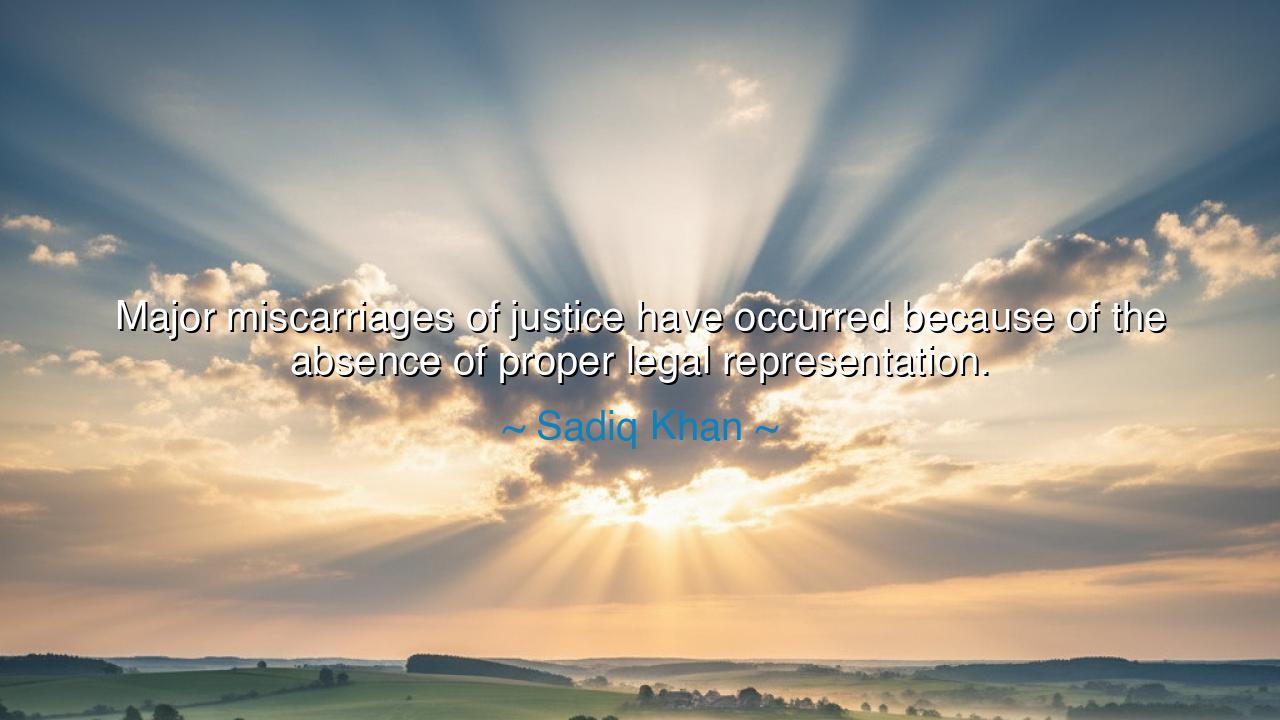
Major miscarriages of justice have occurred because of the
Major miscarriages of justice have occurred because of the absence of proper legal representation.






Hear the solemn cry of Sadiq Khan: “Major miscarriages of justice have occurred because of the absence of proper legal representation.” These words strike not as abstract philosophy but as a lament over lives destroyed, as a warning about the frailty of systems that claim to be just yet fail to provide the means for truth to be heard. They are a call to remembrance—that the law, without counsel, becomes not a shield but a weapon, and that silence in the courtroom is too often the death of innocence.
The meaning of this quote rests upon the sacred truth that justice is not self-executing. The majesty of the law, no matter how noble, cannot defend the poor, the weak, or the voiceless if they have no advocate to speak for them. Legal representation is not luxury; it is the very breath of fairness. Without it, the innocent may be condemned, the guilty may walk free, and the scales of justice tip not by truth but by power. To deny representation is to deny equality itself.
History has given us bitter lessons. Think of the Guildford Four in Britain—four individuals wrongfully convicted in the 1970s of bombings they did not commit. Their trials, flawed by coerced confessions and inadequate defense, became symbols of injustice. Years later, their convictions were quashed, but only after they had suffered years in prison, branded as terrorists. Their tragedy was born, in part, from the absence of fair and proper legal defense, from a system where justice was drowned beneath the cries for vengeance.
We see this also in the history of America, where the Supreme Court in Gideon v. Wainwright declared that the poor, no less than the wealthy, have a constitutional right to an attorney. Clarence Gideon, an uneducated man, was once forced to defend himself at trial, and though innocent, he was convicted. From his handwritten petition from a prison cell came a ruling that transformed the nation: that justice without representation is no justice at all. His story embodies Khan’s words—without counsel, truth is buried, and miscarriages are inevitable.
The deeper wisdom here is that injustice thrives not always through malice, but through neglect. A court may boast of impartial judges and fair laws, but if the accused stands alone, bewildered, unknowing of procedures, unable to challenge falsehoods, then the entire edifice of law collapses. Legal representation is the torch that lights the courtroom, exposing deceit, clarifying truth, and ensuring that justice does not remain a distant ideal but a living reality.
The lesson for us is timeless: justice must be defended, not only in principle but in practice. It is not enough to declare equality before the law; it must be lived by guaranteeing that every person, regardless of wealth or station, has the means to be heard. To neglect this is to betray the very soul of democracy, for the courtroom is not meant to be an arena of power, but a sanctuary of fairness.
Practical action is clear. Support systems of public defense, and honor those who take up the hard labor of representing the voiceless. Demand that governments fund justice not as an afterthought but as a cornerstone. And in our own lives, remember that silence in the face of injustice is complicity; speak for those who cannot, stand with those who stand alone, and lend your strength to those who have none.
Thus let Khan’s words be passed down as a warning and a charge: miscarriages of justice are not accidents, but the fruits of neglect. Only through proper legal representation can the scales of justice be balanced, only through vigilance can innocence be protected, and only through courage can law fulfill its true calling—not to oppress, but to defend, not to silence, but to speak for all.






AAdministratorAdministrator
Welcome, honored guests. Please leave a comment, we will respond soon